年人教版八年级英语下册单元知识点归纳
初二英语下册知识点归纳人教版
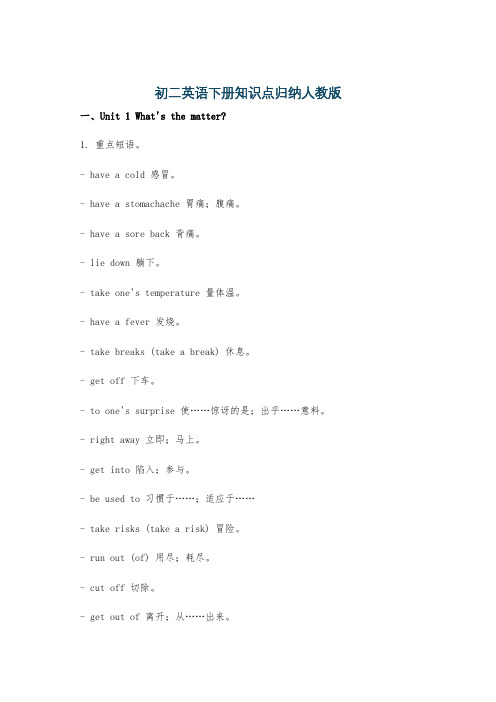
初二英语下册知识点归纳人教版一、Unit 1 What's the matter?1. 重点短语。
- have a cold 感冒。
- have a stomachache 胃痛;腹痛。
- have a sore back 背痛。
- lie down 躺下。
- take one's temperature 量体温。
- have a fever 发烧。
- take breaks (take a break) 休息。
- get off 下车。
- to one's surprise 使……惊讶的是;出乎……意料。
- right away 立即;马上。
- get into 陷入;参与。
- be used to 习惯于……;适应于……- take risks (take a risk) 冒险。
- run out (of) 用尽;耗尽。
- cut off 切除。
- get out of 离开;从……出来。
- be in control of 掌管;管理。
2. 重点句型。
- What's the matter? = What's wrong? = What's the trouble? 怎么了?- Should I put some medicine on it? 我应该在它(伤口)上敷些药吗?- You should lie down and rest. 你应该躺下休息。
- He hurt himself in P.E. class. 他在体育课上伤到了自己。
- Aron Ralston is an American man who is interested in mountain climbing. 阿伦·罗尔斯顿是一个对登山感兴趣的美国人。
3. 语法。
- 情态动词should的用法:should表示“应该”,用来提出建议或劝告,后接动词原形。
例如:You should see a dentist. 否定形式为shouldn't,例如:You shouldn't go to school late.二、Unit 2 I'll help to clean up the city parks.1. 重点短语。
人教版八年级英语下册Unit-1--Unit-3-单元知识点归纳
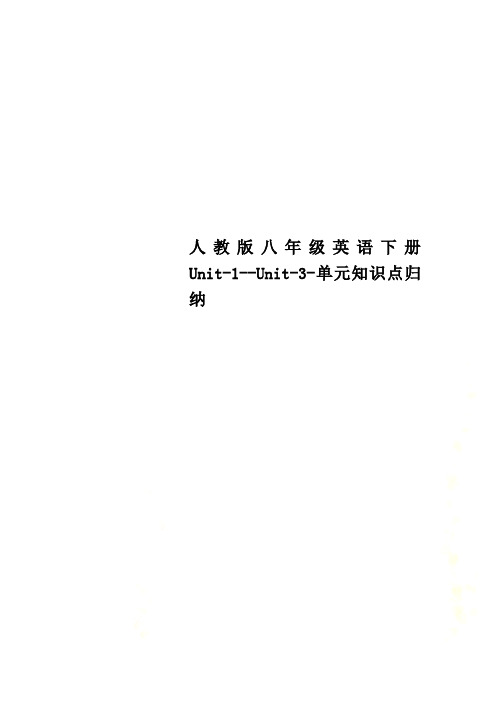
人教版八年级英语下册Unit-1--Unit-3-单元知识点归纳free【动词】使……解脱,得到自由He could not free his arm.free from21. run out用完,用尽 When his water run out, he knew that he would have to do something to save his own life.物sth. tun out. 某物用尽了。
人sb. run out of物sth..人用尽了某物。
He run out of all his money last night.22.risk sth to do sth. 冒着...的风险去做某事 take a risk=take risks 冒险risk doing ...=take the risk of doing ...23. the importance of (doing) sth.(做)某事的重要性 We students should know the importance of (learning) English.importance n. 重要(性), important adj.重要的,unimportant adj.24.decision 【名词】决定;抉择; make a decision to do sth.decide25. be in the control of …掌管,管理 The headmaster is in the control of this new school. be out of control无法控制,无法管理 be under control被控制住,在控制之中26. 【复习】mind意为介意,Would you mind my opening the window?27. give up (doing) sth. 放弃(做)某事,give up (playing) computer games;give up后可接名词、代词和动词ing形式,也可不接,如 Never give up easily.II. 重点短语1. have a fever 发烧2. have a cough 咳嗽3. have a toothache 牙疼4. talk too much 说得太多5. drink enough water 喝足够的水6. have a cold 受凉;感冒7. have a stomachache 胃疼8. have a sore back 背疼9. have a sore throat 喉咙痛10. lie down and rest 躺下来休息11. hot tea w ith honey 加蜂蜜的热茶12. see a dentist 看牙医13. get an X-ray 拍X 光片14. take one’ s temperature量体温15. put some medicine on sth. 在……上面敷药16. feel very hot 感到很热17. sound like 听起来像18. all weekend 整个周末19. in the same way 以同样的方式20. go to a doctor 看医生21. go along 沿着……走22. on the side of the road 在马路边23. shout for help 大声呼救24. without thinking twice 没有多想25. get off 下车26. have a heart problem 有心脏病27. to one’ s surprise使....... 惊讶的28. thanks to 多亏了;由于29. in time 及时30. save a/one’s life挽救生命lose one's life 31. get into trouble 造成麻烦32. right away 立刻;马上33. because of 由于34. get out of 离开;从……出萍35. hurt oneself 受伤36. put a bandage on sth. 用绷带包扎37. fa ll down 摔倒38. feel sick 感到恶心39. have a nosebleed 流鼻血40. cut his knee 割伤他的膝盖41. put her head back 把她的头向后仰42. have problems breathing 呼吸困难43. mountain climbing 登山运动44. be used to doing sth. 习惯做某事45. run out (of) 用完;用尽46. so that 以便47. so. . . that 如此… …以至于…48. be in control of 掌管;管理49. in a difficult situation 在闲境屮50. keep on doing sth. 继续或坚持做某事51. make a decision 做出决定52. take risks 冒险53. give up 放弃III. 重点语法【反身代词】英语中共有八个反身代词,在使用时应注意和它所指的相应的对象在人称、性别、数上保持一致。
最全面人教版八年级下册英语第一单元知识点归纳总结

Unit 1 What's the matter?一、词汇与短语◆重点单词A部分1.matter n. 问题;事情2.sore adj. 疼痛的;酸痛的3.stomachache n. 胃痛;腹痛4.foot n. 脚;足5.neck n. 颈;脖子6.stomach n. 胃;腹部7.throat n. 咽喉;喉咙8.hurt v. (使)疼痛;受伤9.fever n. 发烧10.passenger n. 乘客;旅客11.lie v. 躺;平躺12.break n. 间歇;休息13.rest v. &n. 放松;休息14.onto prep. 向;朝15.X-ray n. X射线;X光16.trouble n. 问题;苦恼17.toothache n. 牙痛18.hit n. (用手或器具)击;打19.headache n. 头痛20.herself pron. (she的反身代词)她自己21.off adv. & prep. 离开(某处);不工作;从……去掉B部分1.bandage n. 绷带v. 用绷带包扎2.press v. 压;挤;按3.sick adj. 生病的;有病的4.knee n. 膝;膝盖5.breathe v. 呼吸6.knife n. 刀7.sunburned adj. 晒伤的8.blood n. 血9.ourselves pron. (we反身代词)我们自己10.mean v. 意思是;打算11.climber n. 登山者;攀登者12.importance n. 重要性;重要13.risk n.&v. 危险;风险;冒险14.decision n. 决定;抉择15.accident n.(交通)事故;意外遭遇16.control v.&n. 限制;约束;管理17.situation n. 情况;状况18.spirit n. 勇气;意志19.kilo( = kilogram) n. 千克;公斤20.death n. 死;死亡21.rock n. 岩石22.nurse n. 护士◆重点短语A部分1.have a cold 感冒2.lie down 躺下3.have a stomachache 胃痛4.take one's temperature 量体温5.have a fever 发烧6.to one's surprise 使……惊讶的是7.get off 下车8.right away 立即;马上9.take breaks (take a break) 休息10.talk too much 说得太多11.drink enough water 喝足够的水12.have a very sore throat 嗓子非常疼13.get an X-ray 拍X光片14.see a dentist 看牙医15.drink some hot tea with honey 喝一些加蜂蜜的热茶16.put some medicine on sth.在……上面敷一些药17.feel very hot 感到很热18.sound like 听起来像19.all weekend 整个周末20.in the same way 以同样的方式21.go to a doctor 看医生22.go along 沿着……走23.on the side of the road 在马路边24.shout for help 大声呼救25.without thinking twice 没有多想26.have a heart problem 有心脏病27.thanks to 多亏了;由于28.in time 及时29.save a life 挽救生命30.get into trouble 陷入麻烦31.hurt oneself 受伤32.fall down落下;摔倒B部分1.be used to 习惯于……;适应于……2.in a difficult situation 在困境中3.take risks (take a risk) 冒险4.keep on doing sth. 继续(或坚持)做某事5.run out (of) 用尽;耗尽6.make a decision 作出决定7.cut off 切除8.get hit on the head 撞到头部9.get out of 离开;从……岀来10.be interested in 对……感兴趣11.give up 放弃12.mean doing sth. 意味着做某事13.put a bandage on sth. 用绷带包扎…14.lose one's life 失去生命15.feel sick 感到恶心16.mountain climbing 登山运动17.have problems breathing 呼吸困难18.be in control of 掌管;管理◆重点句子A部分1.What's the matter with you?=What's the trouble with you?=What's wrong with you?你怎么了?2.What should she do? 她该怎么办呢?3.Did you fall down? 你跌倒了吗?4.Should I take my temperature? 我应该量一下体温吗?5.I think I sat in the same way for too long without moving.我想我以同样的姿势一动不动地坐得太久了。
人教版英语八年级下册Unit 1-5 单元语法知识梳理
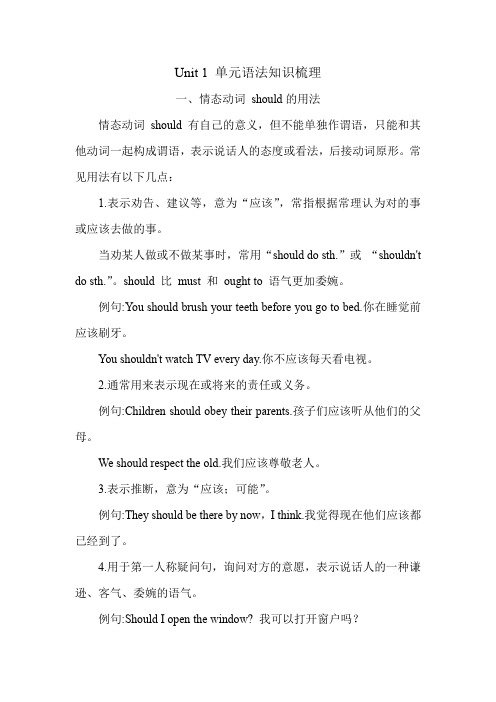
Unit 1 单元语法知识梳理一、情态动词should的用法情态动词should有自己的意义,但不能单独作谓语,只能和其他动词一起构成谓语,表示说话人的态度或看法,后接动词原形。
常见用法有以下几点:1.表示劝告、建议等,意为“应该”,常指根据常理认为对的事或应该去做的事。
当劝某人做或不做某事时,常用“should do sth.”或“shouldn't do sth.”。
should 比must 和ought to 语气更加委婉。
例句:You should brush your teeth before you go to bed.你在睡觉前应该刷牙。
You shouldn't watch TV every day.你不应该每天看电视。
2.通常用来表示现在或将来的责任或义务。
例句:Children should obey their parents.孩子们应该听从他们的父母。
We should respect the old.我们应该尊敬老人。
3.表示推断,意为“应该;可能”。
例句:They should be there by now,I think.我觉得现在他们应该都已经到了。
4.用于第一人称疑问句,询问对方的意愿,表示说话人的一种谦逊、客气、委婉的语气。
例句:Should I open the window? 我可以打开窗户吗?What should we do now? 我们现在该干什么呢?5.表示某种感情色彩,意为“竟会”,常用于以how, why开头引导的特殊疑问句中。
例句:Why should you be so early today? 你今天为什么会如此早?二、反身代词1.反身代词的构成反身代词是一种表示反射或强调的代词。
它由第一人称、第二人称的形容词性物主代词和第三人称代词的宾格加词尾-self或-selves构成。
其构成如下表:反身代词与它所指代的名词或代词形成互指关系,两者在人称和数上应保持一致。
人教版八年级英语下册知识点总结
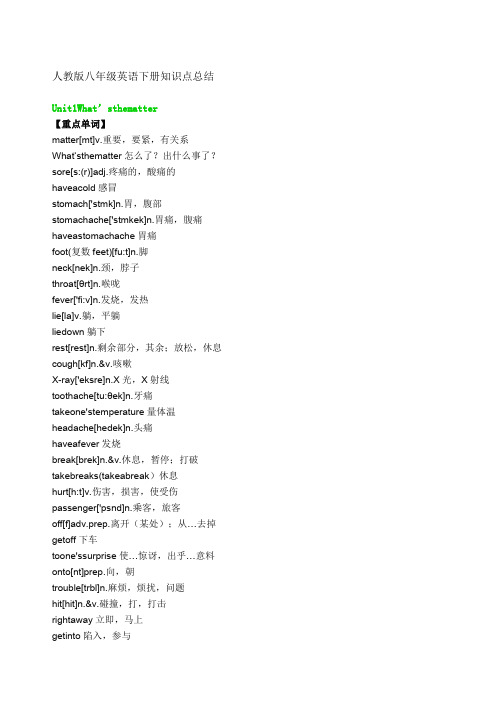
人教版八年级英语下册知识点总结Unit1What’sthematter【重点单词】matter[mt]v.重要,要紧,有关系What’sthematter怎么了?出什么事了?sore[s:(r)]adj.疼痛的,酸痛的haveacold感冒stomach['stmk]n.胃,腹部stomachache['stmkek]n.胃痛,腹痛haveastomachache胃痛foot(复数feet)[fu:t]n.脚neck[nek]n.颈,脖子throat[θrt]n.喉咙fever['fi:v]n.发烧,发热lie[la]v.躺,平躺liedown躺下rest[rest]n.剩余部分,其余;放松,休息cough[kf]n.&v.咳嗽X-ray['eksre]n.X光,X射线toothache[tu:θek]n.牙痛takeone'stemperature量体温headache[hedek]n.头痛haveafever发烧break[brek]n.&v.休息,暂停;打破takebreaks(takeabreak)休息hurt[h:t]v.伤害,损害,使受伤passenger['psnd]n.乘客,旅客off[f]adv.prep.离开(某处);从…去掉getoff下车toone'ssurprise使…惊讶,出乎…意料onto[nt]prep.向,朝trouble[trbl]n.麻烦,烦扰,问题hit[hit]n.&v.碰撞,打,打击rightaway立即,马上getinto陷入,参与herself[h:self]pron.她自己,她本身(she的反身代词)bandage['bndd]n.&v.绷带;用绷带包扎sick[sk]adj.患病的,不适的knee[ni:]n.膝盖nosebleed[nzbli:d]n.鼻出血breathe[bri:e]v.呼吸sunburned[snb:nd]adj.晒伤的ourselves[ɑ:selvz]pron.我们自己(we的反身代词)climber[klam(r)]n.登山者beusedto习惯于…适应于…risk[rsk]n.&v.风险,危险;冒险takerisks(takearisk)冒险accident[ksidnt]n.意外事件;事故situation[sitjuein]n.状况,形式,情况kg=kilogram[klgrm]n.公斤,千克rock[rk]n.岩石runout(of)用尽,耗尽knife[naif]n.刀,餐刀cutoff切除blood[bld]n.血mean[mi:n]v.意味着,意思是,意欲getoutof离开,从…出来importance[mp:tns]n.重要性decision[d'sn]n.决心,决定,抉择control[kn'trl]v.控制,支配,操纵beincontrolof掌管,管理spirit['sprt]n.勇气,意志death[deθ]n.死亡giveup放弃nurse[n:s]n.护士【重点短语】1.haveafever发烧2.haveacough咳嗽3.haveatoothache牙疼4.talktoomuch说得太多5.drinkenoughwater喝足够的水6.haveacold受凉;感冒7.haveastomachache胃疼8.haveasoreback背疼9.haveasorethroat喉咙痛10.takerisks冒险11.hotteawithhoney加蜂蜜的热茶12.seeadentist看牙医13.getanX-ray拍X光片14.takeone’stemperature量体温15.putsomemedicineonsth.在……上面敷药16.giveup放弃17.soundlike听起来像18.allweekend整个周末19.inthesameway以同样的方式20.gotoadoctor看医生21.goalong沿着……走22.onthesideoftheroad在马路边23.shoutforhelp大声呼救24.withoutthinkingtwice没有多想25.getoff下车26.haveaheartproblem有心脏病27.toone’ssurprise另某人惊讶的是28.thanksto多亏了;由于29.intime及时30.makeadecision做出决定31.getintotrouble造成麻烦32.rightaway立刻;马上33.becauseof由于34.getoutof离开;从……出来35.keepondoingsth.继续或坚持做某事36.putabandageonsth.用绷带包扎37.falldown摔倒38.feelsick感到恶心39.haveanosebleed流鼻血40.cuthisknee割伤他的膝盖41.putherheadback把她的头向后仰42.haveproblemsbreathing呼吸困难43.mountainclimbing登山运动44.beusedtodoingsth.习惯做某事45.runout(of)用完;用尽46.sothat以便47.so...that...如此……以至于...…48.beincontrolof掌管;管理49.inadifficultsituation在闲境中【重点句型】1.What'sthematterwithyou=What'thetroublewithyou=What'swrongwithyou你怎么了?2.Whatshouldshedo她该怎么办呢?3.ShouldItakemytemperature我应该量一下体温吗?4.Youshouldliedownandrest.你应该躺下休息一会儿。
人教版八年级英语下册各知识点归纳总结(最新最全)

人教版八年级英语下册各知识点归纳总结Unti1 what’s the matter?短语归纳1.too much 太多2.lie down 躺下3.get an X-ray 做个X光检查4.take one ’s temperature 量体温5.put some medicine on ......在....上敷药6.have a fever 发烧7.take breaks /take a break 休息 8.without thinking twice 没多想9.get off 下车 10.take sb to the hospital 送某人去医院11.wait for等待 12.to one’s surprise 使.......惊讶的13.thanks to多亏于;由于 14.in time及时15.think about 考虑 16.have a heart problem患有心脏病用法归纳1.need to do sth .需要去做某事2.see sb doing sth 看见某人正在做某事3.ask sb sth 询问某人某事4.expect sb to do sth 期望某人做某事5.agree to do sth 同意做某事6.help sb (to) do sth 帮助某人做某事7.want to do sth 想要做某事 8.tell sb to do sth 告诉某人做某事9.have problems(in) doing sth 做某事有困难 e sth to do sth用某物去做某事语法点1.询问某人的健康问题及遇到麻烦的表达方法2.情态动词should的用法3.不定代词的用法精细解读1. What’s the matter (with you)? 怎么了?出什么事了?What’s the trouble/ the problem / wrong with sb./ sth.?2. I had a cold.我感冒了。
人教版八年级英语下册各单元知识点总结完整版

Unit 1 What’s the matter?一、重点短语1. have a fever 发烧2. have a cough 咳嗽3. have a toothache 牙疼4. talk too much 说得太多5. drink enough water 喝足够的水6. have a cold 受凉;感冒7. have a stomachache 胃疼8. have a sore back 背疼9. have a sore throat 喉咙痛10. lie down and rest躺下来休息11. hot tea with honey加蜂蜜的热茶12. see a dentist看牙医13. get an X-ray拍X光片14. take one’ s temperature量体温15. put some medicine on sth在……上面敷药16. feel very hot 感到很热17. sound like 听起来像18. all weekend 整个周末19. in the same way以同样的方式20. go to a doctor 看医生21. go along 沿着……走22. on the side of the road 在马路边23. shout for help 大声呼救24. without thinking twice 没有多想25. get off 下车26. have a heart problem 有心脏病27. to one’ s surprise 使……惊讶的28. thanks to 多亏了;由于29. in time及时30. save a life 挽救生命31. get into trouble 造成麻烦32. right away 立刻;马上33. because of 由于34. get out of 离开35. hurt oneself 受伤36. put a bandage on sth. 用绷带包扎37. fall down 摔倒38. feel sick 感到恶心39. have a nosebleed 流鼻血40. cut his knee割伤他的膝盖41. put her head back 把她的头向后仰42.have problems breathing呼吸困难43. mountain climbing登山运动44. be used to doing sth. 习惯做某事45. run out (of) 用完;用尽46. so that 以便47. so…that 如此……以至于……48. be in control of 掌管;管理49. in a difficult situation 在逆境屮50. keep on doing sth.坚持做某事51. make a decision做出决定52. take risks 冒险53. give up 放弃二、知识点解析1. What’s the matter? 怎么了?若是询问“某人怎么了?”要用“What’s the matter with sb.?”拓展:What’s the matter with sb.? 的同义句:What’s wrong with sb.? / What’s the trouble with sb.?2.疾病类短语:have a +疾病. e.g. :have a fever 发烧have a cold 感冒have a cough 咳嗽.have a +身体部位-ache. e.g.: have a headache 头痛have a toothache 牙痛.have a sore+身体部位. e.g.: have a sore throat咽喉痛have a sore back背痛例题:Mom, I____________.I’m sorry to hear that, dear. We must go to see the dentist right away.A. have a headacheB. have a stomachacheC. have a toothacheD. have a fever3. lie down 躺下V. 躺,平躺。
期末Units1-10单元知识点总结 人教版八年级英语下册
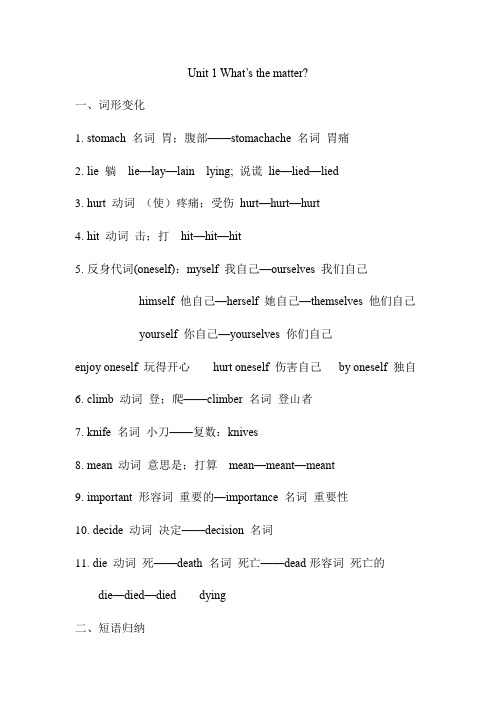
Unit 1 What’s the matter?一、词形变化1.stomach 名词胃;腹部——stomachache 名词胃痛2.lie 躺lie—lay—lain lying; 说谎lie—lied—lied3.hurt 动词(使)疼痛;受伤hurt—hurt—hurt4.hit 动词击;打hit—hit—hit5.反身代词(oneself):myself 我自己—ourselves 我们自己himself 他自己—herself 她自己—themselves 他们自己yourself 你自己—yourselves 你们自己enjoy oneself 玩得开心hurt oneself 伤害自己by oneself 独自6.climb 动词登;爬——climber 名词登山者7.knife 名词小刀——复数:knives8.mean 动词意思是;打算mean—meant—meant9.important 形容词重要的—importance 名词重要性10.decide 动词决定——decision 名词11.die 动词死——death 名词死亡——dead形容词死亡的die—died—died dying二、短语归纳1.lie down 躺下to one’s (my/his/her...) surprise 令某人惊讶的是2.take one’s (my/your/his/her..) temperature 量体温3.take a break = take breaks 休息take a risk = take risks冒险4.run out 物做主语:The money ran out. 钱用光了。
run out of 人做主语:I ran out of money. 我用光了钱。
5.make a decision = make decisions 做决定6.be in control of 掌管He is in control of the company. 他掌管公司。
人教版英语八年级下册知识点

Unit 1 What’s the matter?一、重点短语1. have a fever 发烧2. have a cough 咳嗽3. have a toothache 牙疼4. have a sore back 背疼5. have a sore throat 喉咙痛6.have a cold 受凉;感冒7. have a nosebleed 流鼻血8.have a heart problem 有心脏病9.have a stomachache 胃疼10.have problems breathing 呼吸困难11. talk too much 说得太多12. drink enough water 喝足够的水13. lie down and rest 躺下来休息14. hot tea with honey 加蜂蜜的热茶15. see a dentist 看牙医16. get an X-ray 拍X 光片17. take one’s temperature 量体温18. feel very hot 感到很热19. go along 沿着……走20. go to a doctor 看医生21. get off/on 下车/上车22. get into trouble 造成麻烦23. get into/out of 进入/从……出来24. be in control (of) 掌管;管理25.be out of control(of)失控26. thanks to 多亏了27. on the side of the road 在马路边28. shout for help 大声呼救29. put some medicine on sth. 在…上面敷药30. all weekend 整个周末31.put a bandage on sth. 用绷带包扎32. hurt oneself 受伤33. to one’s surprise 使....... 惊讶的34.fall down 摔倒35. without thinking twice 没有多想36. save a life 挽救生命37. put her head back 把她的头向后仰38. cut his knee 割伤他的膝盖39. be used to doing sth. 习惯做某事40. used to do过去常常41. in the same way 以同样的方式42. sound like 听起来像43. make a decision 做出决定44. because of 由于45. mountain climbing 登山运动46. feel sick 感到恶心47. in a difficult situation 在困境中48. take risks 冒险49. keep on doing sth. 继续做某事50. give up (doing) sth. 放弃51. run out (of) 用完;用尽52. in time 及时on time准时53. right away/at once 立刻54. so that 以便二、重点语法1.What’s th e matter(with sb)?怎么了?询问麻烦事或身体状况=What’s the trouble (with sb)?=What’s the problem (with sb)?=What’s up?=What’s your trouble/problem?2.1.) have a+名词,表示某种病have a cough咳嗽2.)sore也可表疾病have a sore back/throat背疼/喉咙痛3. need有两种词性,实义动词和情态动词实义动词:1. need sth 2. need (sb) to do 3. don’t need.....情态动词:1. need+原型2. Need I ....? 肯Yes,you must. 否No, you needn’t.4.see sb do sth看见某人做某事(强调全过程)see sb doing sth看见某人正在做某事(强调正在发生)5.expect sth期待某物agree with sb同意某人expect(sb) to do 期待做某事agree to do同意做某事expect+that从句期待agree+that从句6.have trouble/problems in doing sth 做某事有困难7.trouble用法:1).be in trouble处于困境2).get(sb) into trouble(使某人)陷入困境8.词组辨析:used to do过去常常be used to doing习惯于做9.so...that+从句如此...以至于so that为了,目的是引导目的状语从句(当主句主语与从句主语一致时可用in order to)Eg: He works hard so that he can succeed=He works hard in order to succeed.10.What’s the meaning of...?=What does...mean?....的意思是什么?11.反身代词:myself, yourself, himself, herself, itself, ourselves, yourselves, themselvesteach oneself,enjoy oneself,dress oneself,introduce oneself,help oneself12.躺:lie-lay-lain-lying 说谎:lie-lied-lied-lying下蛋:lay-laid-laid-laying(规则的撒谎,不规则的躺,躺过就下蛋)Unit 2 I ’ll help to clean up the city parks.一、重点短语1. Clean-Up Day 清洁日2. an old people’s home 养老院3. help out with sth. 帮助解决困难4. used to do sth.过去常常做某事5. care for 关心;照顾6. the look of joy 快乐的表情7. at the age of 在......岁时8. clean up 打扫(或清除)干净9. cheer up (使)变得更高兴;振奋10. give out 分发;散发11. come up with 想出;提出12. make a plan 制订计划13. make some notices 做些公告牌14. try out 试用;试行15. work for 为…工作;为…. 效力16. put up 建造;举起;张贴17. hand out 分发;散发;发给18. call up 打电话;召集19. put off 推迟;延迟20. for example 比如;例如21. raise money 筹钱;募捐22. take after 与......相像;像23. give away 赠送;捐赠24. fix up 修理;修补;解决25. be similar to 与……相似26. set up 建立;设立27. disabled people 残疾人28. make a difference 影响;有作用29. be able to 能够30. after-school reading program课外阅读项目31.a feeling of satisfaction满足感32.several hours若干小时33.volunteer to do自愿做34.sick kids生病的孩子35.homeless people无家可归的人36.be busy with sth忙于37.disabled people残疾人38.a trained dog一只受过训的狗39.book lover爱书者40.think up想出二、重点语法1. notice sb do sth注意到某人做过某事,notice sb doing sth注意到某人正在做某事3.satisfaction用法:1.)satisfy v. satisfy sb 使某人满意2.)satisfied/satisfying adj. be satisfied with对...满意3.)satisfaction n. to one’s satisfaction令某人满意4.owner用法:1.)the owner of...的主人the owner of the shop 2.)one’s own+名词my own shop5. sick adj. 定语,表语sickness n.ill adj. 表语illness n. He is ill.=He is sick. Here is a sick dog.5.raise 及物动词rise 不及物动词The sun rises. Raise your hands.6.take after像(品质,外貌)look like像(外貌)7.imagine+动名词/名词/代词imagine sb doing8.have trouble/problems/difficulty in doing做某事有困难He has trouble in learning English.9.形容词+ness变名词:kind-kindness,ill-illness,sick- sickness, sad-sadness,happy-happiness,busy-business,fair-fairness10.句型辨析:It is clever/smart/kind/nice/friendly of sb to 某人做某事是...的It is +adj+for sb to do 做某事对某人来说是...的11.change one’s mind改变主意change green into yellow由绿变黄12.be interested in=have an interest in 对...感兴趣Unit 3 Could you please clean your room?一、重点短语1.go out for dinner 出去吃饭2. stay out late 在外面待到很晚3. go to the movies 看电影4. take sb. for a walk 带某人去散步5.all day/evening 整曰/夜6.do housework 做家务7. get a ride 搭车8. work on 从事9. finish doing sth. 完成做某事10. clean and tidy 干净整洁11. do the dishes 洗餐具12. take out the rubbish 倒垃圾13. fold the clothes 叠衣服14. sweep the floor 扫地15. make the bed 整理床铺16. as a result结果17. help out 帮忙18. get good grades取得好成绩19. throw down 扔下20.as soon as=the minute 一...就...21. come over 过来22.shout back 大声回应23.walk away 走开24.all the time 一直;总是25.share the housework 分担家务26. a comfortable home 一个舒适的家27.in surprise 惊讶地28. get something to drink 拿点喝的东西29.hang out 闲逛30. watch one show 观看一个节目31. pass sb. sth. 把某物传给某人32. lend sb. sth. 把某物借给某人33. get sth. wet 使某物弄湿34. hate to do sth. 讨厌做某事35. do chores 做杂务36. help sb. (to ) do /with sth 帮助某人干某事37.bring a tent带顶帐篷来38. buy some snacks买些小吃39. go to the store去商店40. invite sb. to a party邀请某人参加聚会41. make sb. do sth. 使某人做某事42. enough stress足够的压力43.a waste of time浪费时间44. in order to为了45. provide sb with sth=provide sth for sb46. mind doing sth. 介意做某事47. depend on依赖;依靠48. look after/take care of 照顾;照看49. develop children’s independence发展孩子的独立性50. do one’s part in (doing ) sth.做某人分内的事51. come home from school/ work放学/下班回家二、重点语法1.Could you please(not) do sth ?用于提出请求,希望得到对方肯定回答,语气较委婉。
人教版八年级下册各单元英语语法解析知识重点总结
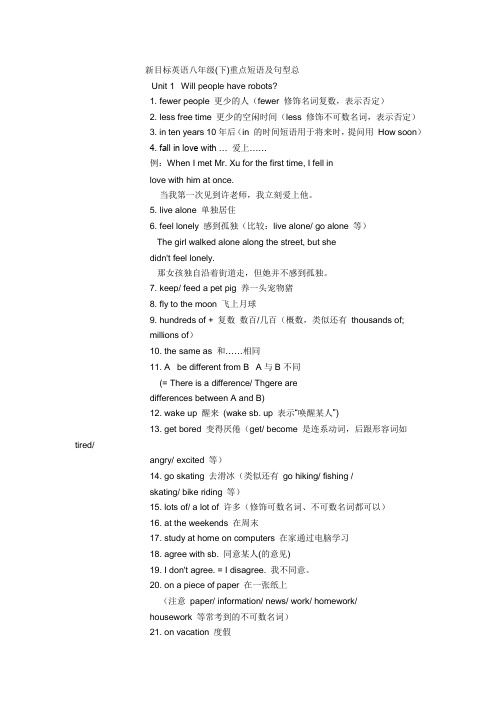
新目标英语八年级(下)重点短语及句型总Unit 1 Will people have robots?1. fewer people 更少的人(fewer 修饰名词复数,表示否定)2. less free time 更少的空闲时间(less 修饰不可数名词,表示否定)3. in ten years 10年后(in 的时间短语用于将来时,提问用How soon)4. fall in love with … 爱上……例:When I met Mr. Xu for the first time, I fell inlove with him at once.当我第一次见到许老师,我立刻爱上他。
5. live alone 单独居住6. feel lonely 感到孤独(比较:live alone/ go alone 等)The girl walked alone along the street, but shedidn't feel lonely.那女孩独自沿着街道走,但她并不感到孤独。
7. keep/ feed a pet pig 养一头宠物猪8. fly to the moon 飞上月球9. hundreds of + 复数数百/几百(概数,类似还有thousands of;millions of)10. the same as 和……相同11. A be different from B A与B不同(= There is a difference/ Thgere aredifferences between A and B)12. wake up 醒来(wake sb. up 表示“唤醒某人”)13. get bored 变得厌倦(get/ become 是连系动词,后跟形容词如tired/angry/ excited 等)14. go skating 去滑冰(类似还有go hiking/ fishing /skating/ bike riding 等)15. lots of/ a lot of 许多(修饰可数名词、不可数名词都可以)16. at the weekends 在周末17. study at home on computers 在家通过电脑学习18. agree with sb. 同意某人(的意见)19. I don't agree. = I disagree. 我不同意。
人教版八年级下册英语知识点总结(最新最全)
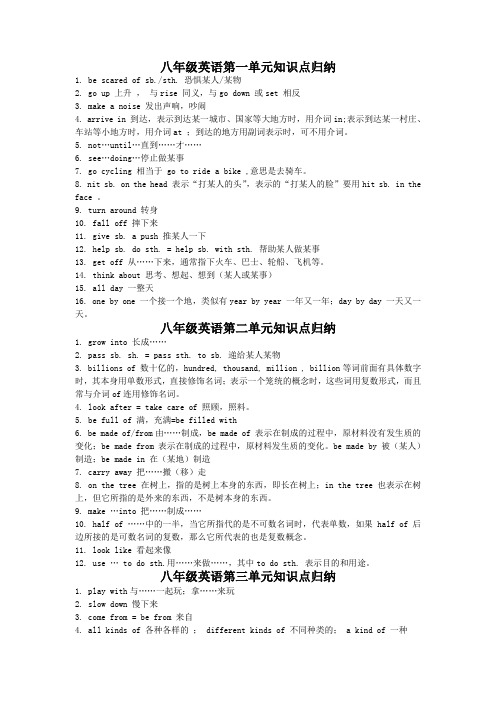
八年级英语第一单元知识点归纳1. be scared of sb./sth. 恐惧某人/某物2. go up 上升,与rise 同义,与go down 或set 相反3. make a noise 发出声响,吵闹4. arrive in 到达,表示到达某一城市、国家等大地方时,用介词in;表示到达某一村庄、车站等小地方时,用介词at ;到达的地方用副词表示时,可不用介词。
5. not…until…直到……才……6. see…doing…停止做某事7. go cycling 相当于 go to ride a bike ,意思是去骑车。
8. nit sb. on the head 表示“打某人的头”,表示的“打某人的脸”要用hit sb. in the face 。
9. turn around 转身10. fall off 摔下来11. give sb. a push 推某人一下12. help sb. do sth. = help sb. with sth. 帮助某人做某事13. get off 从……下来,通常指下火车、巴士、轮船、飞机等。
14. think about 思考、想起、想到(某人或某事)15. all day 一整天16. one by one 一个接一个地,类似有year by year 一年又一年;day by day 一天又一天。
八年级英语第二单元知识点归纳1. grow into 长成……2. pass sb. sh. = pass sth. to sb. 递给某人某物3. billions of 数十亿的,hundred, thousand, million , billion等词前面有具体数字时,其本身用单数形式,直接修饰名词;表示一个笼统的概念时,这些词用复数形式,而且常与介词of连用修饰名词。
4. look after = take care of 照顾,照料。
5. be full of 满,充满=be filled with6. be made of/from由……制成,be made of 表示在制成的过程中,原材料没有发生质的变化;be made from 表示在制成的过程中,原材料发生质的变化。
人教版八年级下册英语——知识点语法归纳总结
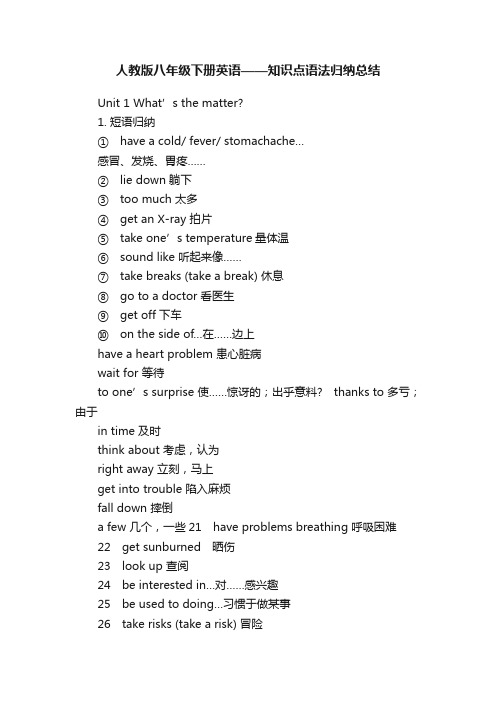
人教版八年级下册英语——知识点语法归纳总结Unit 1 What’s the matter?1. 短语归纳①have a cold/ fever/ stomachache…感冒、发烧、胃疼……②lie down 躺下③too much 太多④get an X-ray 拍片⑤take one’s temperature量体温⑥sound like 听起来像……⑦take breaks (take a break) 休息⑧go to a doctor 看医生⑨get off 下车⑩on the side of…在……边上have a heart problem 患心脏病wait for 等待to one’s surprise 使……惊讶的;出乎意料? thanks to 多亏;由于in time 及时think about 考虑,认为right away 立刻,马上get into trouble 陷入麻烦fall down 摔倒a few 几个,一些21 have problems breathing 呼吸困难22 get sunburned 晒伤23 look up 查阅24 be interested in…对……感兴趣25 be used to doing…习惯于做某事26 take risks (take a risk) 冒险27 lose one’s life 丧生28 became of 因为29 run out (of) 用尽,耗尽30 be ready to do sth. 准备做某事31 cut off 切除32 climb down 爬下33 get out of 离开;从……出来34 tell of 讲述35 the importance of (doing sth.) (做某事的)重要性36 be in control of 掌管,管理37 make a decision 做决定38 keep on doing sth. 坚持做某事39 give up 放弃40 cut/ hurt oneself 使自己受伤2. 典句必背①What’s the matter?②I have a stomachache.③What should I do?④Should I take my temperature?⑤I think you should lie down and rest.⑥If your head and neck still hurt tomorrow, then go to a doctor.⑦His love for mountain climbing is so great that he kept on climbing mountains even after this experience.3. 用法集萃(1) 当别人心情不好,身体不适或遇到麻烦时,我们可以用如下表达表示关心:What’s the matter?What’s the matter with you?What’s wrong with …?What’s the trouble\problem with …?(2) 英语中常用have描述身体的不适,此时have意为“患有”,常用结构:①have a + 疾病例:have a cold 感冒;have a fever 发烧;have a cough 咳嗽②have a + 身体部位-ache例:have a headache 头痛;have a toothache 牙痛③have a sore + 身体部位例:have a sore throat 咽喉痛;have a sore back 背痛(3) lie down躺下;tell lies/a lie 说谎含义过去式过去分词躺;平躺lay lain位于撒谎;说谎lied lied(4) maybe & may be①maybe,“或许”,常用于句首,表示可能性,后加句子。
人教版八年级英语下册各单元语法点汇总

U n i t1W h a t’s t h e m a t t e r 一、询问某人的健康问运及遭到麻烦的表达方法1询问某人患了何种疾病或遇到了何种麻烦时;常用以下几种结构来表达:What’s the matter with sb.某人怎么了What’s wrong with sb.某人怎么了What’s the trouble with sb.某人出什么事了What happened to sb.某人发生了什么事Are you OK你没事吧Is there anything wrong with sb. 某人有什么事吗(2)要表达身体疼痛或不舒服;可用以下结构:①某人+have/has+病症.The twins have colds.双胞胎感冒了..某人+have/has+a+headache/toothache/stomachache/backache/earache.She had a stomachache last night.她昨晚肚子痛..③某人+have/has+a+sore+发病部位. He has a sore throat.他喉咙痛..④某人+hurts+身体部位或反身代词. He hurt his leg.他的腿受伤了..⑤某部位+hurts.My head hurts badly.我头痛得厉害..⑥某人+have/has+a pain+in one’s+身体部位; I have a pain in my chest.我胸口痛..⑦There issomething wrong with one’s+身体部位.There is something wrong with my right eye..我的右眼有毛病..⑧其他表达方式She has a heart trouble.她有心脏病..He got hit on the head他头部受到了撞击..She cut her finger.她割破手指了..二情态动词should的用法1.Should为情态动词;意为“应该;应当”;否定式为shouldn’t;其后接动词原形;无人称和数的变化..常用来表示征询意见、建议、劝告、要求或义务等.. You should drink hot water with honey.你应该喝加有蜂蜜的开水..He should put his head back他应该把头后仰..We should try our best to help him.我们应当尽力去帮助他.. You shouldn‘t watch TV.你不应该看电视..2.Should用于主语为第一人称的疑问句;表示征询意见.. Should I put some medicine on it 我应当给它敷上药吗 Should we tell her about it我们应该告诉她这件事吗拓展在英语中;表示建议的说法有很多;而且都是中考考查的重点..主要结构有:①Would you like to do sth.你想要/愿意做某事吗Would you like to play basketball with me你想要和我一起打篮球吗②Shall I/we do sth 我/我们做好吗Shall we go to the zoo tomorrow明天我们去动物园;好吗③Why not do sth 为什么不呢Why not join us为什么不加入到我们当中来呢④How/What about doing sth 做某事怎么样 How about going swimming去游泳怎么样⑤Let’s do sth让我们做吧.. Let’s go home.咱们回家吧..⑥You’d better not do sth你最好不要做某事..You’d better not go there alone.你最好不要一个人去那儿..Unit 2 I'll help clean up the city parks动词不定式A. 作主语——为避免句子的头重脚轻;常用it作为形式主语;而真正的主语动词不定式后置..常用句型:It +be+adj./n.+for/of sb. to do sth./It takes sb. some time to do sth.B. 作宾语——动词want; decide; hope; ask; agree; choose; learn; plan; need; teach; prepare…常接动词不定式作宾语..C. 作后置定语——常用于“have/has+sth.+to do”或“enough+名+to do”“It’s time to do sth.”等结构中..D. 作宾语补足语——tell; ask; want; invite; teach; like; call等可接带to的动词不定式作宾语补足语;构成tell/ask/want /call/invite sb. to do sth.结构..“一感feel;二听listen to; 注意动词不定式作使役动词和感官动词的宾语补足语时应省去to:hear;三让let; make; have;;四看look at; see; watch; notice;半帮助help”..E. 动词不定式作状语主要用来修饰动词;表示目的;结果或原因..为了强调目的;有时可以把动词不定式放在句首;或在不定式前加in order to 或so as to “为了;目的是”..常用结构有too + adj./adv. + to do sth.等..F. 固定句式中动词不定式的用法常见的形式有:had better not do sth./Would you like to do sth./Why not do sth./Would you please not do sth.等..Unit 3 Could you please clean your roomCould you please...句型1请求别人时通常用此句型;也可以说:Can you...please情态动词could或can在这里均表示请求;在意思上无区别;但是用could在于其上显得更委婉、客气、诚恳..在日常生活中常使用could you/I...若在句末加上please;则显得更礼貌..Could you help me find my book;please你能帮我找到我的书吗(2)对could you/I...的问句作出肯定回答;常用“sure/certainly/of course”等;如果作否定回答;常用“sorry或oh;please don’t”.. 一般不用no开头;用no显得语气生硬、不礼貌..(3)表示请求的句式:Would you like to do... Would you mind doing... Let’s do.... Shall I/we do... Please do...祈使句前加please提示:could you please...与could I Please...两种问句;前者是请求别人帮忙的句式;后者是有礼貌地向别人请求允许的交际用语..试比较:Could you please help me请你帮我一下好吗Could I please invite my friends to my birthday party;Mom 妈妈; 我能邀请我的朋友参加我的生日聚会吗Unit 4 Why don't you talk to your parents1.提建议向别人发出邀请;请求;建议;或征求某人的意见的其他表达方式:How /what about doing sth.about是个介词;可跟名词或动名词“…怎么样”You’d better not do something.“你最好不做某事”Would you like sth …:“你想要某物Let s do sth…What should I do … should表示请求、征询对方意见2.学会谈论问题和学会用why don't you…提建议向别人发出邀请;请求;建议;或征求某人的意见的表达方式:Why don t you do something =Why not do something 你为什么不做某事呢来表示请求、征询对方意见3.until; so that ;although引导的状语从句:1until:在带有till或until引导的时间状语从句里;如果主句用肯定式;其含义是“一直到……时”;谓语动词只能用延续性动词..如果主句用否定式;其含义是“直到……才……”; “在……以前不……”; 谓语动词可用瞬间动词..Don t get off until the bus stops.2so that引导目的状语从句为了;以便例如:He studies hard so that he could work better in the future3although的用法意思相当于though尽管;虽然;引导让步状语从句..引导的从句不能与并列连词but;and; so等连用;但可以和yet; still等词连用.. 例如:Although he was tired; he went on working.尽管他很累;但是他继续工作..Unit 5 What were you doing when the rainstorm came过去进行时1. 基本概念:过去进行时表示在过去某一时刻或一段时间内正在进行的动作..这一特定的过去时间除有上下文暗示以外; 一般用时间状语来表示..2.结构 was / were not + 动词-ing3.句式肯定式:I/He/She/It was working. We/You/They/ were working.否定式:I/He/She/It was not working.We/You/They/ were not working.疑问式和简略回答:Was I working Yes; you were. No; you were not. Were you working Yes; I was. No; I was not. Was he/she/it working Yes; he/she/it was. No; he/she/it was not. Were we/you/they working Yes; you/we/they were. No; you/we/they were not. 注:1 was not常缩略为wasn’t; were not常缩略为weren’t..2 一般过去时与过去进行时用法的比较: 一般过去时表示在过去某个时间发生过的动作或存在的状态; 而过去进行时则表示在过去某一时刻或某一段时间正在进行的动作.. 例如: David wrote a letter to his friend last night. 大卫昨晚给他的朋友写了封信..信写完了..David was writing a letter to his friend last night. 大卫昨晚一直在给他的朋友写信..信不一定写完..4.过去进行时中的when和whilewhen; while 区别:1)由when引导的时间状语从句;主句用过去进行时;从句应用一般过去时;由while引导的时间状语从句;主句用一般过去时;从句应用过去进行时..When the teacher came in; we were talking.当此句改变主从句的位置时;则为: While we were talking; the teacher came in. 2如果从句和主句的动作同时发生;两句都用过去进行时的时候;多用while引导..如:They were singing while we were dancing.Unit 6 An old man tried to move the mountains1. unless引导条件状语从句unless = if … not ―除非;若不They will go tomorrow unless it rains.= They will go tomorrow if it doesn’t rains.2. as soon as引导时间状语从句.. ―……就He will come and see you as soon as he can.3. so.......that引导结果状语从句句型1:主语+谓语+so+形容词/副词+that从句The wind was so strong that we could hardly move forward.句型2: so +形容词 + a/an + 单数名词 + that从句It was so hot a day that they all went swimming.句型3. so + many/ few + 复数名词 + that从句He has so few friends that he often feels lonely.句型4: so +much/ little + 不可数名词 + that 从句I had so little money that I couldn’t buy a pen.Unit 7 What’s the highest mountain in the world形容词副词的原级、比较级和最高级一原级句型:1. A is as+原级+ as+ B 表示A 与B一样…eg: He is as tall as me.2.A is not as/so +原级+ as B表示A不如B…eg:He is not as tall as me.3.只能修饰原级的词;very;quite;so;too;so; enough; pretty等例如;He is too tired to walk on.他太累了以至于不能再继续走了..(二)比较级句型可以修饰比较级的词;much;a lot;far;…的多a little;a bit;…一点儿 even甚至;still 仍然Eg. Lesson One is much easier than Lesson Two.第一课比第二课容易得多.. Tom looks even younger than before.汤姆甚至比以前更年轻..1.当句中有than 时则用比较级.. eg: He is fatter than me.2.当句子中的比较对象为两者时用比较级:“特殊疑问词+be+形容词比较级;A or B ”eg: Which is bigger;the earth or the moon 哪一个大;地球还是月球3. “比较级+and+比较级”表示“越来越……”..eg.The flowers are more and more beautiful.花儿越来越漂亮..加more构成比较级的形容词则用more and more +形容词表示越来越…eg: English is more and more important.4.“the+比较级;the+比较级”表示“越……;越……”..Eg. The more careful you are;the fewer mistakes you’ll make.5.“A+be+the+形容词比较级+of the two+……”表示“A是两者中较……的”..Eg.Look at the two boys. My brother is the taller of the two.6.A+be+形容词比较级+than+any other+单数名词+介词短语”表示“A比同一范围的任何一个人/物都……”;含义是“A最……”..Eg. The Yangtze River is longer than any other river in China.=The Yangtze River is the longest river in China.三最高级常用句型结构1.“主语+be+the+形容词最高级+单数名词+in/of短语”表示“……是……中最……的”.. eg:Tom is the tallest in his class./of all the students.This apple is the biggest of the five.2.“主语+be+one of the+形容词最高级+复数名词+in/of短语”表示“……是……中最……之一”..Eg:Beijing is one of the largest cities in China.3.“特殊疑问词+be+the+最高级+A;B;or C ”用于三者以上eg Which is the biggest The moon;the sun or ths earth4.“the +序数词+最高级+单数名词+范围”..表示…是第几大…eg: The Yellow River is the second longest river in China .注意形容词最高级之前要加the;但当最高级之前有形容词性物主代词或名词所有格时则不用加theeg: He is the best student in my class. He is my best friend.(四)形容词副词的规则与不规则变化规则变化1.一般在词尾直接加er或est;例如;tall-taller-tallest;long-longer-longest2.以不发音的字母e结尾的单词在词尾直接加r或st;例如;nice-nicer-nicest3.以辅音字母+y结尾的词;把y变为i;再加er或est;例如;heavy-heavier-heaviest4.重读闭音节;末尾只有一个辅音字母;双写这个辅音字母;再加er或est;eg. big-bigger-biggest5.部分双音节词和多音节词分别在原级前加more构成比较级和most构成最高级;例如;slowly-more slowly-most slowly;beautiful- more beautiful-most beautiful 不规则变化Unit 8 Have you read Treasure Island yetUnit 9 Have you ever been to a museum现在完成时 Present Perfect Tense1表示过去发生或已经完成的动作对现在造成的影响或结果..—It’s so dark. 太黑了..—Someone has turned off the light. 有人把灯关上了..2表示从过去某一时间开始并一直持续到现在的动作或状态..常与since+过去的时间点;for+一段时间;since+时间段+ego; so far等时间状语连用.. Eg. I have lived here for ten years.我已经住在这里10年了..从10年前开始;持续到现在还住这儿Eg. I have lived here since 2003. 自从2003年我就住在这儿..从2003年开始;持续到现在还住这儿3 基本结构及句型转换:主语+have/has+过去分词done 当主语是第三人称单数has;其余人称用have..①肯定句:主语+have/has+过去分词+其他 I have finished my homework. 肯定句②否定句:主语+have/has+not+过去分词+其他 I have not finished my homework. 否定句③一般疑问句:Have/Has+主语+过去分词+其他—Have you finished your homework—Yes; I have. / No; I haven’t; 一般疑问句及肯定、否定回答4has gone to; has been to; has been in 的区别Have/Has goneto :去了现在不在说话现场Eg. ---Where is your father---He has gone to Shanghai.Have/Has been to :去过已不在去过的地方Eg. My father has been to Shanghai.Have/has been in:呆了多久还在所呆的地方Eg. My father has been in Shanghai for two months. =My father has been in Shanghaisince two months ago.5现在完成时的标志:①常与just; already; yet; ever; never; before; so far 等连用;强调动作的完成;不强调动作的持续..Have you ever been to Japan I have just finished my homework.②for + 时间段;since + 过去的时间点;since + 段时间 ago;since + 一般过去时的句子..They have known each other for five years. Since he was a child; he has lived in England.(6)动词过去式和过去分词的变化规则变化: 1. 一般在动词词尾直接加ed..如:pick → picked → picked; wish →wished → wished; stay → stayed → stayed2. 以不发音的e结尾的动词后面加d..如:like → liked → liked; hope → hoped →hoped; phone → phoned → phoned3. 以―辅音字母 + y‖结尾的动词;变y为i;再加-ed..如:study → studied → studied; hurry → hurried → hurried; reply → replied → replied4. 词尾只有一个辅音字母的重读闭音节动词;要双写辅音字母;再加-ed..如:stop →stopped → stopped; clap → clapped → clapped不规则变化:5.以不变应万变..如:let → let → let; put → put → put; read → read → read6. 若中间有双写e;则去掉一个e;单词末尾再加t..如:feel → felt → felt; keep → kept → kept; sleep → slept → slept7. 结尾的字母d变t..如:lend → lent → lent; build → built → built; send →sent → sent8. 变为以-ought或-aught结尾..如:buy → bought → bought;bring → brought → brought; catch → caught → caught; teach → taught →taughtUnit 10 I've had this bike for three years.短暂性动词buy; die; join; finish等不能直接与for; since 连用; 需要改变动词..1)beginstart--be on2 open--be open3)become--be4)die--be dead5) fall asleep-- be asleep6)close -- be closed7)end/ finish---be over8) put on--wear9)leave-- be awayfrom 10)catch a cold--have a cold11)join the army--in the army/be a soldier12)borrow---keep13)join the party-- be in the party/ be a party member14) buy---have15come/go/ arrive/reach/get /move to---be in /at总结:1.现在完成时表示过去发生的动作对现在造成的影响和结果;2.还可以表示过去发生的动作;一直持续到现在;也有可能持续下去.3..一般情况下;for+时间段; since+过去的时间点;since + 段时间 ago;since + 一般过去时的句子4.句型:现在完成时态have/has+延续性动词的过去分词+ for/ since...。
人教版八年级英语下册全册知识点考点整理

八年级英语下册全册各单元知识点考点整理Unit 1 what's the matter?一、重点短语1.too much太多2.lie down躺下3.get an X-ray做个X光检查4.take one’s temperature量体温5.put some medicine on......在....上敷药6.have a fever发烧7.take breaks/take a break休息8.without thinking twice没多想9.get off下车10.take sb to the hospital送某人去医院11.wait for等待12.to one’s surprise使.......惊讶的13.thanks to多亏于;由于14.in time及时15.think about考虑16.have a heart problem患有心脏病17.get into the trouble遇到麻烦18.do the right thing做正确的事情事情19.fall down摔倒20.put......on sth把...放在某物上21.get hit/sunburned摔伤/烧伤22.be interested in对.....感兴趣23.be used to习惯于....24.take risks/take a risk挑战25.lose one’s life失去生命26.because of因为27.run out of用完28.cut off切除29.get out of从...出来30.make a decision/decisions做决定31.be in control of掌管;管理32.give up放弃主要句型1.It’s+形容词+for sb.+to do sth.做某事对某人来说是…的。
It’s important to do sth.做某事很重要。
Unit 1 单元知识点总结课件--八年级英语下册(人教版)

02 作表语
描述身体/精神状态或感觉
常放be, feel, seem, look…后
You can be yourself.
03 作同位语
强调作用, 常作主语或宾语 的同位语, 表示“亲自,本人” The story itself is good. .
02
(die- died- died- dying)
She died 2 years ago.
04 dying adj. 垂死的,要死的
This is a dying bird.
2.7 risk
n. 危险,风险
the risk of … …的风险 Staying up will increase the risk of the illness.
lie down and rest / shouldn’t eat so much next time
④ have a toothache
see a dentist and get an X-ray
⑤ have a fever
take one’s temperature
⑥ have a headache
Words
matter, lie, enough, mean…
2.1 matter
n. 问题,事情
-- What’s the matter with you? -- I hurt my leg.
v. 要紧,有关系
It doesn’t matter.
2.2 enough
位置:前形副后
adj. 足够的,充足的 enough + n I have enough money.
人教版初中英语八年级下册全册各单元知识点、语法归纳整理
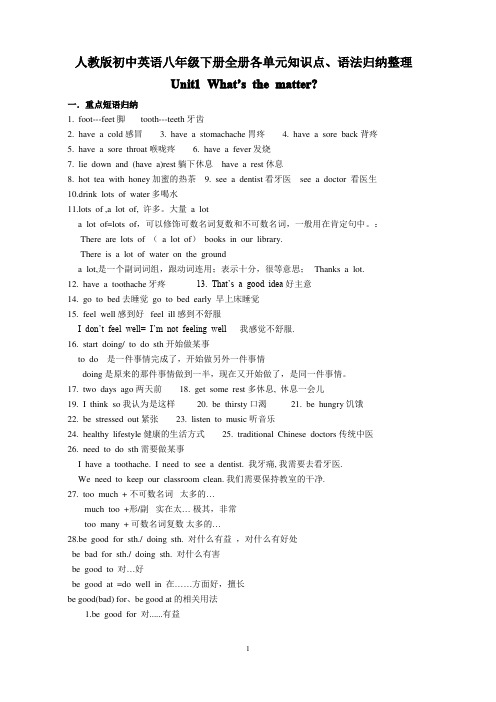
人教版初中英语八年级下册全册各单元知识点、语法归纳整理Unit1W hat’s the matter?一.重点短语归纳1.foot---feet脚tooth---teeth牙齿2.have a cold感冒3.have a stomachache胃疼4.have a sore back背疼5.have a sore throat喉咙疼6.have a fever发烧7.lie down and(have a)rest躺下休息have a rest休息8.hot tea with honey加蜜的热茶9.see a dentist看牙医see a doctor看医生10.drink lots of water多喝水11.lots of ,a lot of,许多。
大量a lota lot of=lots of,可以修饰可数名词复数和不可数名词,一般用在肯定句中。
:There are lots of(a lot of)books in our library.There is a lot of water on the grounda lot,是一个副词词组,跟动词连用;表示十分,很等意思;Thanks a lot.12.have a toothache牙疼13.That’s a good idea好主意14.go to bed去睡觉go to bed early早上床睡觉15.feel well感到好 feel ill感到不舒服I don’t feel well=I’m not feeling well我感觉不舒服.16.start doing/to do sth开始做某事to do是一件事情完成了,开始做另外一件事情doing是原来的那件事情做到一半,现在又开始做了,是同一件事情。
17.two days ago两天前18.get some rest多休息,休息一会儿19.I think so我认为是这样20.be thirsty口渴21.be hungry饥饿22.be stressed out紧张23.listen to music听音乐24.healthy lifestyle健康的生活方式25.traditional Chinese doctors传统中医26.need to do sth需要做某事I have a toothache.I need to see a dentist.我牙痛,我需要去看牙医.We need to keep our classroom clean.我们需要保持教室的干净.27.too much+不可数名词太多的…much too+形/副实在太…极其,非常too many+可数名词复数太多的…28.be good for sth./doing sth.对什么有益,对什么有好处be bad for sth./doing sth.对什么有害be good to对…好be good at=do well in在……方面好,擅长be good(bad) for、be good at的相关用法1.be good for对......有益Doing morning exercises is good for your health.做早操对你们的建康有益。
人教版八年级英语下册1-5单元知识点归纳
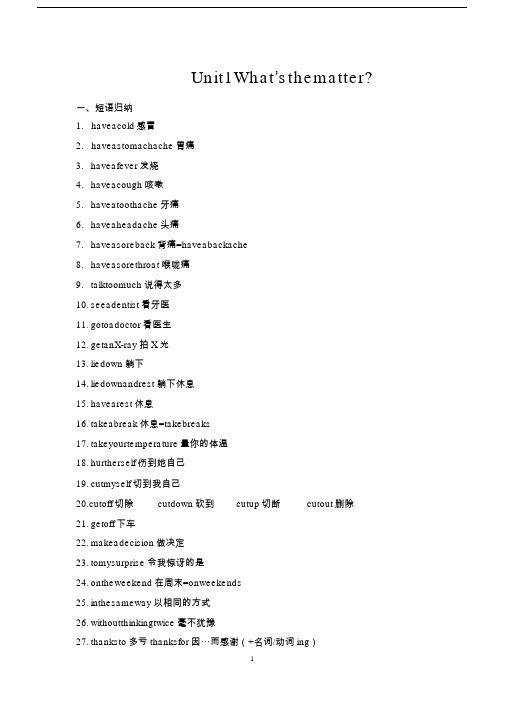
Unit1What’sthematter?一、短语归纳1.haveacold感冒2.haveastomachache胃痛3.haveafever发烧4.haveacough咳嗽5.haveatoothache牙痛6.haveaheadache头痛7.haveasoreback背痛=haveabackache8.haveasorethroat喉咙痛9.talktoomuch说得太多10.seeadentist看牙医11.gotoadoctor看医生12.getanX-ray拍X光13.liedown躺下14.liedownandrest躺下休息15.havearest休息16.takeabreak休息=takebreaks17.takeyourtemperature量你的体温18.hurtherself伤到她自己19.cutmyself切到我自己20.cutoff切除cutdown砍到cutup切断cutout删除21.getoff下车22.makeadecision做决定23.tomysurprise令我惊讶的是24.ontheweekend在周末=onweekends25.inthesameway以相同的方式26.withoutthinkingtwice毫不犹豫27.thanksto多亏thanksfor因⋯而感谢(+名词/动词ing)28.intime及时ontime按时29.savealife挽救生命30.getintotrouble陷入麻烦31.rightaway马上32.falldown跌倒33.waitfor等待34.beinterestedindoingsth.对做某事感兴趣35.giveup放弃二、用法集萃1.询问有什么病或有什么麻烦:What’sthematter(withsb.)?2.疾病的表达:have/hasa+疾病名称3.太多:toomuch+不可数名词;toomany+可数名词复数形式太:muchtoo+形容词4. enough足够的:①形容词+enough②enough+名词③itisenough+todosth.5. lie躺下过去式:lay现在分词:lying6.seesb.doingsth.看见某人正在做某事(正在进行)seesb.dosth.看见某人做了某事(看见动作的全过程)7.expecttodosth.期望做某事8.needtodosth.需要做某事9.helpsb.(to)dosth.帮助某人做某事10.tellsb.(not)todosth.告诉某人(不要)做某事11.asksb.todosth.要求某人做某事12.wanttodosth.想要做某事13.agreetodosth同.意做某事disagreetodosth.不同意做某事agreewithsb.同意某人的意见14.trouble问题;麻烦havetrouble/problemdoingsth.做某事有困难15.介词+doing常见的介词有:at;for;with;without;inabout16.be/getusedtodoingsth.习惯于做某事17.keepondoingsth.继续做某事18.minddoingtsh.介意做某事19.反身代词:myself我自己yourself你自己himself他自己herself她自己itself它自己复数:ourselves我们自己yourselves你们自己themselves他们自己20.knife-knives刀名词复数规则变化:①一般情况+s②以e结尾+s③以s、x、ch、sh结尾+es④以辅音字母+y结尾,变y为i+es⑤以o结尾,有生命+es;无生命+s⑥以f/fe结尾,变f/fe为v+es不规则变化:foot-feet脚、足tooth-teeth牙齿man-men男人woman-women女人mouse-mice老鼠21.important重要的importance重要性different不同的difference差异性22.death死亡(名词)die死(动词)dead死的(形容词)三、书面表达Howtokeephealthy如何保持健康Healthisimportant.Everyonewantstobehealthy.Letmetellyouhowtokeephealthy.Firstofall,weshouldeathealthyfood.Weshouldeatmorevegetablesandfruit.Wealson eedtodrinkmilk.Secondly,weshouldexercisealot.Weshoulddosomesportsafterschool.Finally,weshouldhaveenoughsleep.Tohaveagoodrest,weshouldgotobedearlyandgetupearly.Ithinkitisimportantforustokeephealthy.3Unit2I’llhelptocleanupthecityparks.一、短语归纳1. cleanup打扫干净cheerup使兴起来代词放中间2.giveout分发3.handout分发eupwith想出;提出(idea、plan等)5. putoff推迟puton穿衣服putup张贴putaway把⋯收好6.callup打电话;征召edtodosth.曾经做某事beusedtodingsth习.惯于做某事8. lonely孤独的(常用于feel之后)alone独自一人9.carefor照顾=takecareof10.afeelingofsatisfaction一种满足感11.tryout参加⋯选拔12.raisemoney募捐13.fixup修理14.giveaway赠送(money、oldclothes/books等)giveup放弃15.takeafter(外貌或行为)像16.besimilarto与⋯相似17.setup建立18.makeadifference影响;有作用19.disabledpeople残疾人20.makeaplan制定计划21.oldpeople’shome养老院22.helpoutwithsth.帮助解决困难23.abooklover书迷24.attheageof在⋯岁时etrue实现(与dream连用)26.atthesametime同时27.homelesspeople无家可归的人28.beworriedabout为⋯而担心worryabout担心29.forexample例如30.runoutof用完31.not⋯anymore不再32.atonce立刻;马上=rightaway二、用法集萃1.volunteertodosth自愿做某事2. difficult困难的difficulty困难havedifficulty(in)doingsth.做某事有困难3.excited兴奋的(人作主语)exciting使人兴奋的(物作主语)口诀:人+ed物+ing4.疑问词(how,what,where)+todo5. decidetodosth.决定做某事名词形式:decision makeadecision做决定6.learntodosth.学习做某事7.agoodwaytodosth.做某事的好方法8.wouldliketodosth.=wanttodosth.想要做某事9.thankyouforsth./doingsth.因某事/做某事而感谢10.kind善良的kindness善意Unit3Couldyoupleasecleanyourroom?一、短语归纳1.dothedishes清洗餐具2.takeouttherubbish倒垃圾3.foldtheclothes叠衣服foldmy/your/hisclothes4.sweepthefloor扫地5.makethebed铺床makemy/your/hisbed6.cleanthelivingroom打扫客厅7.helpoutwithsth.帮助解决某事8.atleast至少eover过来;顺便来访10.infrontof在⋯前面11.takethedogforawalk遛狗12.allthetime一直13.assoonas一⋯就⋯14.insurprise惊讶地15.hangout闲逛16.dochores做家务17.awasteoftime浪费时间18.inorderto为了19.getgoodgrades取得好成绩20.dependon依靠21.takecareof=carefor=lookafter照顾22.asaresult结果23.fallill生病二、用法集萃1.finishdoingsth.完成做某事2.if如果(主将从现,if后为从句,用一般现在时);是否(位于动词之后)3.assoonas一⋯就⋯.主将从现,assoonas后为从句4.replyangrily生气地回答(副词修饰动词,一般位于动词之后)abeautifuldog一只漂亮的狗(形容词修饰,名词,位于名词前)口诀:形名动副5.beangrywithsb.生某人的气6.as+形容词原级+as和⋯一样7.neitherdidI我也没有neither+be动词/助动词(do/does/did)/情态动词+主语“主语也不⋯..”so+be动词/助动词(do/does/did)/情态动词+主语“主语也⋯”8.can-could可以can,could还可以表示请求,could比can更有礼貌肯定回答:Sure./Ofcourse./Noproblem./Yes,sure.否定回答:No,youcan’t./Sorry,Ican’t.9.asksb.todosth.要求某人做某事10.borrow⋯from⋯跟⋯借(借进来)lend⋯to⋯把⋯借给⋯.(借出去)11.invitesb.todosth.邀请某人做某事12.helpwithsth.helpsb.(to)dotsh.帮助做某事13.havetimetodosth.有时间做某事havenotimetodosth没.时间做某事14.letsb.dosth.让某人做某事15.makesb.dosth.让某人做某事16.spend花费人+spend+时间+onsth/doingsth在某事上花时间/花时间做某事cost花费物+cost+金钱$某物花了多少钱take(took)花费Ittakes/tooksb.+时间+todo.做某事花了某人多少时间payfor付费17.itis+adj(forsb.)+todosth.做某事对某人而言是⋯的18.fair公平的unfair不公平的fairness公平性19.doone’spartindoingsth.尽自己的职责做某事20.the+比较级,the+比较级越...越⋯比较级and比较级越⋯越⋯theearlier⋯thebetter越早越好betterandbetter越来越好Unit4Whydon’tyoutalktoyourparents?一、短语归纳1.talkto/withsb.与某人交谈talkaboutsth.谈论某事2.freetime空闲时间3.allowab.todosth.允许某人做某事allowdoingsth.允许做某事4.hangout闲逛5.getintoafight争吵;打架6.sothat为了;以便于7.lookthrough浏览;快速查看8.workout成功地发展;解决9.getonwith/getalongwith和睦相处municatewithsb.与某人交谈11.abigdeal重要的事petewithsb.与某人竞争13.examskills应试技巧14.cutout删除pare⋯with⋯比较16.not..until直到⋯才17.arguewithsb.与某人争吵18.noproblem没问题19.not..anymore不再20.inmyopinion依我看21.thanksfor因⋯而感谢22.allkindsof各种各样的23.worryabout为⋯而担心=beworriedabout二、用法集萃1.提建议句型:①Youshould/shouldn’t dosth.②How/Whataboutdoingsth.?③Whydon’tyoudosth.?④Whynotdosth.?⑤Shallwedosth.?⑥Let’sdosth.⑦You’dbetterdosth.⑧Wouldyouminddoingsth.?常见回答:Goodidea./Soundsinteresting./I’dliketo./Great.否定:I’dloveto,butIhaveto⋯/Sorry,Ican’t.2.beangrywithsb.生某人的气3. although/though虽然不与but连用4.advice建议(不可数名词)5.refusetodosth.拒绝做某事6.instead代替;反而(位于句首或句尾)insteadof代替(位于句中)7.offertohelp提供帮助8.minddoingsth.介意做某事9.continuetodo/doingath.继续做某事10.keepondoingsth.继续做某事11.afew一些(肯定)few一点点(否定)修饰可数名词复数形式alittle一些(肯定)little一点点(否定)修饰不可数名词做题步骤:先看横线后的名词,判断可数还是不可数;其次,理解句子表达的肯定还是否定12.it’s timeforsth.该做某事了=it’stimetodosth.pete竞争(动词)competition竞争(名词)14.havetimetodosth有.时间做某事Unit5Whatwereyoudoingwhentherainstormcame?一、短语归纳1.gooff闹钟发出响声2.rainheavily下大雨3.pickup接电话;采摘4.atfirst起先5.fallasleep进入梦乡6.diedown逐渐变弱7.havealook看一看8.makeone’sway费力地前进9.insilence沉默10.takedown拆除;往下拽;记录11.atthetimeof⋯当⋯.的时候12.waitfor等待13.atthattime在那时(一般过去时标志词)14.wakeup醒来15.goshopping去购物16.takeashower洗澡17.inamess乱七八糟18.forexample例如19.makesure确保二、用法集萃1.过去进行时定义:表示在过去某一时刻或某一时间段正在进行的动作。
人教版八年级下册英语知识点总结

人教版八年级下册英语知识点总结英语知识点Unit 1 What ’s the matter?一、重点短语1. have a fever 发烧2. have a cough 咳嗽3. havea toothache 牙疼 4. talk too much说得太多 5. drink enough water 喝足够的水 6. have a cold 受凉 ; 感冒 7. have astomachache 胃疼 8. have a sore back 背疼 9. have a sore throat 喉咙痛 10. lie downand rest 躺下来休息 11. hot tea w ith honey 加蜂蜜的热茶 12. see a dentist 看牙医13. get an X-ray 拍 X 光片14. take one’ s temperature 量体温 15. put some medicineon sth. 在,, 上面敷药 16. feel very hot 感到很热17. sound like 听起来像 18. allweekend 整个周末 19. in the same way ? 以同样的方式 20. go to a doctor 看医生 21. goalong 沿着,, 走 22. on the side of the road 在马路边 23. shout for help 大声呼救24. without th inking twice 没有多想 25. get off 下车 26. have a heart problem 有心脏病27. to one ’ s surprise 使 [ 京讶的 28. thanks to 多亏了;由于 29. intime 及时 30. save a life 挽救生命 31. get into trouble 造成麻烦 32. right away 立刻;马上 33. because of 由于 34. get out of 离开; 从,, 出萍 35. hurt oneself 受伤36. put a bandage on sth. 用绷带包扎 37. fa ll down 摔倒 38. feel sick 感到恶心 39.have a nosebleed 流鼻血 40. cut his knee 割伤他的膝盖 42. have problems breathing 呼吸困难 43. mountain climbing 登山运动 44. be used to doing sth. 习惯做某事 45. runout (of) 用完 ; 用尽 46. so that 以便 47. so. . . that 如此, , 以至于, 48. be incontrol of 掌管; 管理 49. in a d iffic u lt situation 在闲境屮 50. keep on doing sth.继续或坚持做某事 51. make a decision 做出决定 52. take risks 冒险 53. give up 放弃二、重点句型1. What’ s the matter? What’ s the matter with you? = What’s the trouble with you?= What’ s wrong with you? 你怎么了 2. W hatshould she do? 她该怎么办呢?Should I take my temperature? 我应该量一下体温吗?主语+ should/shouldn ’t + 动词原形. .. ①You should lie down and rest. 你应该躺下休息一会儿。
人教版八年级下册英语Unit 3单元语法知识点总结

人教版八年级下册英语Unit 3单元语法知识点总结本单元重点短语的具体用法1. do the dishes:洗餐具- I need to do the dishes before going out.(我出门前需要洗餐具。
)2. take out the rubbish:倒垃圾- Can you take out the rubbish, please?(你能倒一下垃圾吗?)3. fold your clothes:叠衣服- Remember to fold your clothes neatly.(记得把你的衣服叠整齐。
)4. sweep the floor:扫地- She sweeps the floor every day.(她每天都扫地。
)5. make your bed:整理床铺- It's your turn to make your bed.(轮到你整理床铺了。
)6. clean the living room:打扫客厅- We need to clean the living room before guests arrive.(在客人到来之前,我们需要打扫客厅。
)7. go out for dinner:出去吃饭- Let's go out for dinner tonight.(我们今晚出去吃饭吧。
)8. go to the movies:去看电影- They like to go to the movies on weekends.(他们喜欢在周末去看电影。
)9. stay out late:在外面待到很晚- Don't stay out late, it's not safe.(别在外面待太晚,不安全。
)10. get a ride:搭车- I'll get a ride with my friend.(我会和我朋友一起搭车。
)11. work on doing sth:从事做某事- He is working on writing a novel.(他正在写一本小说。
- 1、下载文档前请自行甄别文档内容的完整性,平台不提供额外的编辑、内容补充、找答案等附加服务。
- 2、"仅部分预览"的文档,不可在线预览部分如存在完整性等问题,可反馈申请退款(可完整预览的文档不适用该条件!)。
- 3、如文档侵犯您的权益,请联系客服反馈,我们会尽快为您处理(人工客服工作时间:9:00-18:30)。
2017年人教版八年级英语下册单元知识点归纳Unit 1 W hat’s the matter?一、重点短语归纳1. foot---feet 脚 <复> tooth---teeth 牙齿 <复>2. have a cold 感冒3. have a stomachache 胃疼4. have a sore back背疼5. have a sore throat喉咙疼6. have a fever发烧7. lie down and (have a)rest 躺下休息have a rest 休息8. hot tea with honey 加蜜的热茶9. see a dentist 看牙医see a doctor 看医生10.drink lots of water多喝水11.lots of ,a lot of 许多;大量 a lota lot of=lots of,可以修饰可数名词复数和不可数名词,一般用在肯定句中。
:a lot,是一个副词词组,跟动词连用;表示十分,很等意思;Thanks a lot.好主意14. go to bed 去睡觉go to bed early 12. have a toothache牙疼13. That’s a good idea早上床睡觉15. feel well感到好 feel ill 感到不舒服我感觉不舒服. 16. start doing/ to do sth开始做某事I don’t feel well= I’m not feeling wellto do 是一件事情完成了,开始做另外一件事情doing是原来的那件事情做到一半,现在又开始做了,是同一件事情。
17. two days ago两天前18. get some rest 多休息;休息一会儿19. I think so我认为是这样20. be thirsty口渴21. be hungry 饥饿22. be stressed out紧张23. listen to music听音乐24. healthy lifestyle健康的生活方式25. traditional Chinese doctors传统中医26. need to do sth 需要做某事I have a toothache. I need to see a dentist. 我牙痛, 我需要去看牙医.We need to keep our classroom clean. 我们需要保持教室的干净.27. too much + 不可数名词太多的…much too +形/副实在太…极其,非常too many + 可数名词复数太多的…28.be good for sth./ doing sth. 对……有益,对……有好处be bad for sth./ doing sth. 对……有害be good to 对…好be good at =do well in 在……方面好,擅长29.get good grades 取得好成绩30.angry 用法be angry with sb生某人的气be angry at/ about sth 就某事生气做某事是容易的。
It’s important to do sth . 做某事很重要。
31.It’s easy to do sth32.balanced diet平衡饮食33.get tired 感到疲倦be/get tired34.stay healthy 保持健康=keep healthy=keep in good health.=He should eat nothing. 他不应当吃任何东西.35.He shouldn’t eat anything36.give sb some advice给某人建议give advice 提出建议采纳或听从某人的建议advice 是不可数名词 a piece of advice 一则建议take one’s adviceHe gave me some good advice. 他向我提了一些很好的意见。
49.sleep 8 hours a night 每晚睡眠八小时get enough sleep 得到充足的睡眠50.take medicine 吃药服药I have to take medicine three times a day for my cold.因为感冒,我不得不一天吃三次药。
二固定结构形容词+ for sb. + to do sth.It’s +做某事对某人来说是…的。
It’s important to do sth .做某事很重要。
It’s important for me to eat a balanced diet.平衡饮食对我来说是很重要的.做某事是容易的。
It’s easy to do sthIt’s easy for us to find out the answer.找出答案对我们来说是容易的三.重点句子你怎么啦?1.What’s the matter ? What’s the mater with you ?=What’s the trouble with you?=What’s wrong with you?I have a cold / have a sore back / have a stomachache…那太糟糕了. 你应该/不该…2.That’s too bad. You should / shouldn’tYou should lie down and rest / drink hot tea with honey / see a dentist / see a doctor .他不应当吃任何东西.He shouldn’t eat anything = He should eat nothing.3.I’m not felling well . 这里well表示身体状况,不能用good代替我感觉不舒服.I don’t feel well= I’m not feeling well4.When did it start ? About two days ago . 什么时候开始的?大约两天前5.I hope you fell better soon . 我希望你很快好起来这里better是well的比较级10.It’s easy to have a healthy lifestyle ,and it’s important to eat a balanced diet . 有一个健康的生活方式很容易,饮食平衡是很重要的。
→ It’s easy to do sth .做某事重要做某事容易/ It’s important to do sth .四.知识结构1.情态动词should的用法should是情态动词,它的基本用法是必须和其他动词一起构成谓语。
情态动词没有人称和数的变化,意为"应该......"。
should(应当,应该)用于所有人称,表示劝告或建议。
eg. You should wait a little more.你应该再多等一会儿。
--- I have a very bad cold.我感冒很厉害。
--- You should lie down and have a rest.你应该躺下,多喝水。
2.maybe与may be。
如:1.maybe是副词,译为“也许、可能”,相当于“perhaps”Maybe he can answer the question.也许他能回答那个问题。
He maybe is from the USA, too. 他可能也来自美国。
如:2.may be中的may为情态动词,译为“可能是......”He may be from the USA, too.他可能也来自美国。
She may be our English teacher.她可能是我们的英语老师3.few、a few、little、a little的区别和联系:1.few / a few用来修饰可数名词,few表示否定意义,没有,几乎没有; a few表示有肯定意思,有几个。
例如:He has few friends here, he feels lonely. 他这里没朋友,他感觉寂寞。
There are a few eggs in the basket.篮子里有几个鸡蛋。
2.little / a little用来修饰不可数名词,little表示否定意思,没有,几乎没有。
a little 表示肯定意思,有一点儿。
例如:There is little ink in my bottle, can you give me a little ink?我的瓶子里没有墨水了,你能给我点儿墨水吗?4.not…until直到…(否定句) 才,动词为短暂性或瞬间性动词She didn’t leave until we came.He went shopping after he got up.=He didn’t go shopping until /before he got up.……until/till直到···(肯定句)动词为延续性动词We stayed here till/until 12 o’clock.Unit 2 I'll help clean the city parks.一.知识点:短语动词小结常见短语动词结构有下面几种:1.动词+副词如:give up 放弃turn off 关掉stay up 熬夜这种结构有时相当于及物动词,如果其宾语是代词,就必须放在动词和副词之间,如果是名词,则既可插在动词和副词之间,也可放在短语动词后。
2. 动词+介词如:listen to 听look at 看belong to 属于这种结构相当于及物动词,后面跟宾语。
3. 动词+副词+介词如:come up with 提出,想出run out of 用完,耗尽4. 动词+名词(介词) 如:take part in参加catch hold of 抓住1.cheer (sb.) up使(某人)高兴、振作如:cheer me up 使我高兴clean up 打扫clean-up n. 打扫2. homeless adj. 无家可归的 a homeless boy 一个无家可归的男孩3. sick adj. 生病的作表语、定语ill adj. 生病的作表语,不能作定语4. volunteer to do v. 志愿效劳、主动贡献volunteer n. 志愿者5. come up with 提出想出=think up 想出catch up with 赶上追上6. put off doing 推迟做某事put on 穿上(指过程) put up 张贴7. write down 写下记下8. call up 打电话make a telephone call 打电话10. set up 成立建立The new hospital was set up in 2000. 这座医院是在2000年成立的。
